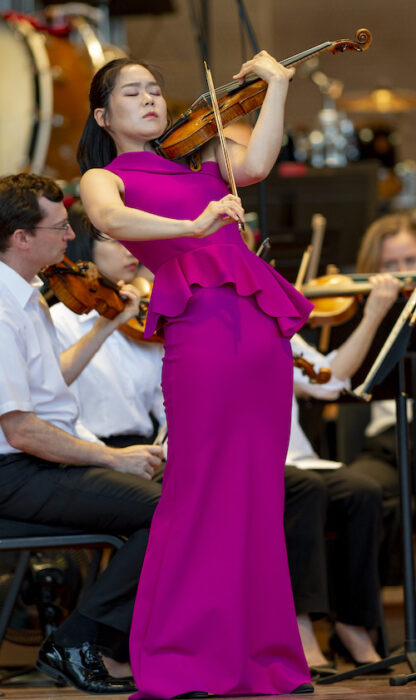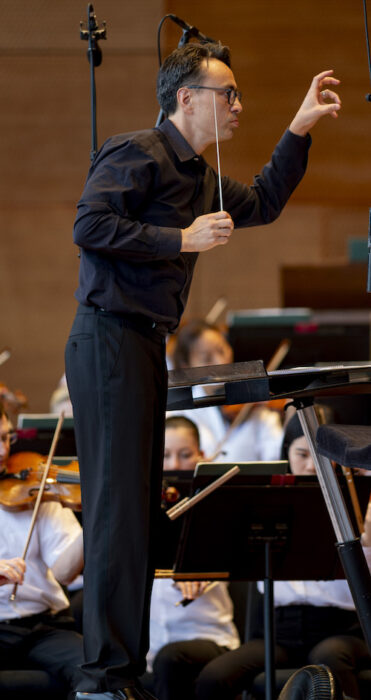Russian rarities take flight at the Grant Park Music Festival

Russian music is an ineradicable mainstay of summer concert rituals and so it proved again Wednesday night at the Pritzker Pavilion.
But, typical of the venturesome Grant Park Music Festival, the program conducted by Ken-David Masur avoided the usual Slavic suspects, serving up an infrequently heard concerto and a rare version of a familiar work.
Alexander Glazunov is less known today for his music than for the persistent urban legend that he was drunk when he conducted the disastrous premiere of Rachmaninoff’s First Symphony. Glazunov’s works are invariably dismissed as respectably crafted but second-rate Russian Romanticism—Tchaikovsky without the tunes or talent. That’s not entirely wrong but the best of Glazunov’s music deserves more then its current near-total neglect.
That surely applies to the composer’s Violin Concerto performed Wednesday night, which has indelible melodies, virtuosic thrills and a slam-bang finish—all in just 18 minutes.
Esther Yoo, who has recorded the Glazunov concerto (DG), proved a stellar advocate for this quirky but engaging work in her festival debut. Performing on the “Prince Obolensky” Stradivarius, Yoo played with a slender yet burnished tone and showed herself fully in synch with the rhapsodic lyricism of the score. Often leaning far back as she dug into the music, the soloist drew out the fantasy quality of the cadenzas and handled the formidable technical challenges, including extensive double stops, high harmonics, and left-hand pizzicatos, with unruffled ease and gleaming virtuosity.
Masur’s accompaniment was not on the same level. While attentive and supportive of the soloist, the surging Romanticism of the music felt decidedly muted under his direction. Too often orchestral sections sounded pallid with crucial scoring felicities either under-projected or inaudible. One missed the fire and bold primary colors that Carlos Kalmar would have provided in this repertoire.
Yoo, however, fully deserved the obligatory standing ovation granted all soloists at the lakefront festival. She responded with an encore of Souvenir d’Amerique by Henri Vieuxtemps. It may be two weeks after July 4th but Yoo threw off Vieuxtemps’ showpiece variations on “Yankee Doodle” with technical skill and huge panache, mining the humor and fizzing virtuosity for all their worth. Too bad the premature applause buried the violinist’s final note.
Like Yoo, Masur was also making his Grant Park debut. Music director of the Milwaukee Symphony Orchestra and principal conductor of the Civic Orchestra, Masur’s podium skills were shown to better advantage in the other two works of the evening.

Someone must have realized belatedly that the scheduled program contained less than an hour of music and Carlos Simon’s Profiles was added to the lineup. Despite being a late addition, the engaging young composer was on hand to introduce his work.
Masur led a spirited performance of the outer parts of Simon’s musical triptych. The light and energetic style made suitable summer fare (although the first part, “The Block” goes on too long for its material).
The central portrait, “Empress of the Blues,” is a portrait of the legendary singer Bessie Smith, and Simon incorporates some smartly scored bluesy solos for front-desk players against a backdrop of swaying strings. Principal cellist Walter Haman delivered a personality-plus, sassy-sleazy spotlight turn.
The evening concluded with Mussorgsky’s not unfamiliar Pictures at an Exhibition, but this time with a difference. The work was performed, not in the usual orchestration by Maurice Ravel, but a version penned in the 1950s by Sergei Gorchakov.
While more economical and less kaleidoscopic in scoring, Gorchakov’s transcription tends to emphasize dynamic contrasts, faithfully reflecting the keyboard original. Some sections of Gorchakov’s version, such as “Tuileries” and the “Ballet of Chicks in their Shells,” are similar to Ravel, and casual listeners—like those obliviously wolfing down food on the center-left aisle—may not notice any difference.
But the changes are significant. Gorchakov gives the troubadour solo in “The Old Castle” to an oboe rather than Ravel’s more exotic saxophone. “Bydlo” starts fortissimo rather than beginning quietly and slowly building volume. Gorchakov’s “Catacombs” is more bombastic than Ravel’s haunting eeriness, and the former’s finale is less of a sonic spectacular, with no pealing bells. Gorchakov also restores the final repeat of the Promenade theme, which was excised by Ravel (probably wisely).
Masur’s illustrious conductor father, Kurt Masur, was an advocate for Gorchakov’s arrangement and recorded it for Teldec. The younger Masur likewise made a worthy case for this alternative version, leading a vivid, strongly characterized performance while underlining with clarity the differences from the familiar Ravel.
Ultimately, while an intriguing listen, hearing Gorchakov’s workmanlike version—even performed as well as this—made one appreciate Ravel’s arrangement even more. It also illustrated the contrast between game competency and musical genius.
The Grant Park Orchestra members played with power and brilliance throughout, apart from a jarringly sour brass player in the finale. There was no lack of excitement or cumulative impact in Gorchakov’s more baldly scored “Great Gate of Kiev,” and the audience rewarded Masur and the GPO musicians with a prolonged and resounding ovation.
Numerous composers and conductors have tried their hand at orchestrating Pictures at an Exhibition over the past century and a half. Leonard Slatkin has recorded a fascinating compendium (Naxos) that draws on different arrangers for each section (including Leopold Stokowski, Henry Wood, Vladimir Ashkenazy, Walter Goehr, Lucien Cailliet, Ravel, Gorchakov, and others), which is well worth checking out.
Carlos Kalmar conducts the Grant Park Orchestra and Chorus in Brahms’ German Requiem and Joel Thompson’s Seven Last Words of the Unarmed 6:30 p.m. Friday and 7:30 p.m. Saturday. gpmf.org
Posted in Performances


